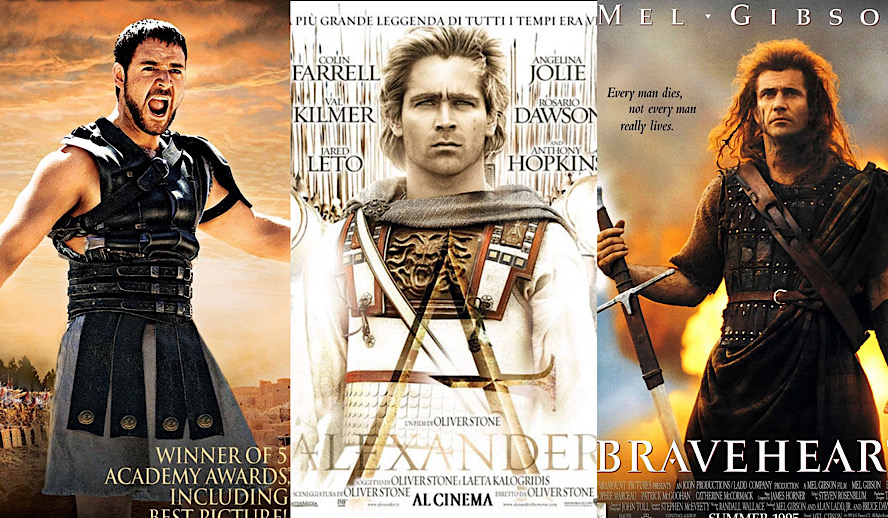Table of Contents

Video Version of this Article
Photo/Video: Historical Epic Movies/Hollywood Insider YouTube Channel
If you were alive in the ‘00s, you must remember the cavalcade of historical epics whose sepia-toned posters were mainstays of the cinema walls–’Gladiator’, ‘Troy’, ‘300’, ‘Apocalypto’, ‘Kingdom of Heaven’, ‘The Passion of the Christ’, ‘The Last Samurai’, ‘Master and Commander: The Far Side of the World’–the list goes on. You may wonder if ‘The Passion of the Christ’ truly belongs here, but the religious and historical are so closely entwined that I might as well conflate them here–is ‘Ben-Hur’ (any version) but one or the other? What about ‘The Mission’, or ‘Silence’?
Related article: A Tribute to Cannes Film Festival: A Celebration of Cinema, Glamour, and Humanity | Statement From Hollywood Insider’s CEO Pritan Ambroase
Historical Epic Movies
The historical epic has always been the biggest of show biz–consider ‘Gone with the Wind’, famously the highest-grossing film in history (adjusted for inflation) and the most expensive to produce at the time (though possibly losing out to the $4 million 1925 ‘Ben-Hur’). If that isn’t as Old Hollywood as it gets, we can go back even further–’The Birth of a Nation’.
Let’s not tiptoe around the fact ‘The Birth of a Nation’ is unabashedly racist KKK propaganda, and also understand that like-minded individuals have only learned to be more discreet over time–that out of the way, it was the first 12-reel film ever made, meaning it was the first film to clock in at three hours of runtime, and it was the first film to employ hundreds of extras for a battle sequence.
The industry quickly scaled up–’Gone with the Wind’ famously exhausted the Screen Actors Guild’s 1500 members to play dead and wounded Confederate soldiers, bolstering that even further with 1000 dummies. The famous chariot race scene in ‘Ben-Hur’ required 15,000 extras and an 18-acre backlot, but none of that compares to the 300,000 extras who attended Gandhi’s funeral–in which movie, you can probably guess.
In short, the “historical epic” is aptly named–it overlaps with a number of subgenres, but you know it when you see it. Religious epics like ‘Ben-Hur’ and ‘The Ten Commandments’ preceded the ‘60s boom of epic historical dramas like ‘Spartacus’, ‘Lawrence of Arabia’, ‘Cleopatra’, and ‘Doctor Zhivago’–this was the first golden age.
Related article: MUST WATCH – Hollywood Insider’s CEO Pritan Ambroase’s Love Letter to Black Lives Matter – VIDEO
Subscribe to Hollywood Insider’s YouTube Channel, by clicking here.
Director David Lean (‘Lawrence of Arabia’, ‘Doctor Zhivago’, and also ‘The Bridge on the River Kwai’) was a giant of the era whose wide shots of the Arabian desert remain the definition of an epic landscape. It’s worth it to mention his usage of special spherical lenses and 70mm film, marketed as Super Panavision 70–he wasn’t the first to use it (that honor goes to ‘The Big Fisherman’, a lesser-known religious historical drama about the life of Peter the Apostle), but Lean used it better. ‘Lawrence of Arabia’s languid pace and breadth of movement is a direct result of the massive format–quicker cuts and movement would be literally nauseating to theater audiences.
New Hollywood Directors
The popularity of historical epics would sharply decline from the ‘70s onward, displaced by the grittier realism of New Hollywood directors and the cynical angst surrounding Vietnam and the Cold War. Of course, I don’t deign to establish a causal link between the social conditions of the time and the decline of the historical epic’s popularity–but it’s very tempting to speculate.
Historians have the privilege of regarding the past as a mere accumulation of happenings, but the historical epic must tell a story, weaving a narrative around sympathetic protagonists to do so–the genre is subsequently prone to facilitating propaganda. Consider the very first entry–’The Birth of a Nation’. Compare that to ‘Gods and Generals’, which came out in 2003–Ronald F. Maxwell and Ted Turner’s 3½ hour tribute to the Lost Cause of the Confederacy.
The resurgence of the historical epic in the ‘00s was led by Mel Gibson’s ‘Braveheart’ and Ridley Scott’s ‘Gladiator’, the latter more so–in fact, Scott would continue to lead the new wave with films like ‘Kingdom of Heaven’, ‘Robin Hood’, and ‘Exodus: Gods and Kings’, though their middling successes could perhaps be attributed to (or simply referred to as) the genre’s subsequent denouement. Gibson would follow up on ‘Braveheart’ with ‘The Passion of the Christ’ and ‘Apocalypto’, both notable for attempting to have dialogue completely in their respective historical languages.
The Second Wave
Other successful films of the second wave included ‘Troy’, featuring Brad Pitt in his prime as the hero Achilles, ‘Master and Commander: The Far Side of the World’, which featured Russell Crowe of ‘Gladiator’ fame and Paul Bettany (who puts the Vision in ‘WandaVision’), Martin Scorsese’s ‘The Aviator’, which featured Leonardo DiCaprio as the eccentric tycoon Howard Hughes, and Zack Snyder’s heavily-stylized ‘300’. Many other films didn’t do so well. Oliver Stone’s ‘Alexander’ stands out as a critically-reviled box-office bomb, coming out the same year (2004) as the middlingly-received ‘King Arthur’. Ridley Scott would also never replicate the success and iconicism of ‘Gladiator’, even with Russell Crowe back to lead in ‘Robin Hood’.
Related article: Hollywood Insider’s CEO Pritan Ambroase: “The Importance of Venice Film Festival as the Protector of Cinema”
Related article: The Masters of Cinema Archives: Hollywood Insider Pays Tribute to ‘La Vie En Rose’, Exclusive Interview with Director Olivier Dahan
Related article: – Want GUARANTEED SUCCESS? Remove these ten words from your vocabulary| Transform your life INSTANTLY
Since then, the historical epic has all but dropped off the face of the Earth. Few notable examples exist in the 2010s–both Darren Aronofsky’s ‘Noah’ and Scott’s ‘Exodus: Gods and Kings’ came out in 2014, but were controversially received for the casting of White actors in Biblical roles. ‘King Arthur: Legend of the Sword’, which came out in 2017, was a box office bomb that cut short a planned six-film franchise. Netflix has produced a couple, and I really mean a couple–’Outlaw King’, starring Chris Pine as the Scottish King Robert the Bruce, and ‘The King’, starring Timothée Chalamet as Henry V.
For now, it seems that interest in the historical epic is low–but is it adieu, or au revoir? In the modern age of increased social scrutiny, it’s tempting to surmise that a greater pushback against conventional historical narratives has contributed to the genre’s dwindling popularity. In fact, history lives on–but in different ways. More films than ever are being produced about America’s underrepresented Black history, by Black creators, including films like ‘Selma’, ‘Ma Rainey’s Black Bottom’, and ‘Judas and the Black Messiah’.
It’s also tempting to chalk it up to the tides of trends–can it be assumed that one day, inevitably, the historical epic will make a bombastic return? For now, it’s au revoir–but only time will tell.
By Daniel Choi
Click here to read Hollywood Insider’s CEO Pritan Ambroase’s love letter to Black Lives Matter, in which he tackles more than just police reform, press freedom and more – click here.
An excerpt from the love letter: Hollywood Insider’s CEO/editor-in-chief Pritan Ambroase affirms, “Hollywood Insider fully supports the much-needed Black Lives Matter movement. We are actively, physically and digitally a part of this global movement. We will continue reporting on this major issue of police brutality and legal murders of Black people to hold the system accountable. We will continue reporting on this major issue with kindness and respect to all Black people, as each and every one of them are seen and heard.
Just a reminder, that the Black Lives Matter movement is about more than just police brutality and extends into banking, housing, education, medical, infrastructure, etc. We have the space and time for all your stories. We believe in peaceful/non-violent protests and I would like to request the rest of media to focus on 95% of the protests that are peaceful and working effectively with positive changes happening daily. Media has a responsibility to better the world and Hollywood Insider will continue to do so.”
Ways to support Black Lives Matter Movement to end systemic racism
More Interesting Stories From Hollywood Insider
– Want GUARANTEED SUCCESS? Remove these ten words from your vocabulary| Transform your life INSTANTLY
– Compilation: All James Bond 007 Opening Sequences From 1962 Sean Connery to Daniel Craig
– Do you know the hidden messages in ‘Call Me By Your Name’? Find out behind the scenes facts in the full commentary and In-depth analysis of the cinematic masterpiece
– A Tribute To The Academy Awards: All Best Actor/Actress Speeches From The Beginning Of Oscars 1929-2019 | From Rami Malek, Leonardo DiCaprio To Denzel Washington, Halle Berry & Beyond | From Olivia Colman, Meryl Streep To Bette Davis & Beyond
– In the 32nd Year Of His Career, Keanu Reeves’ Face Continues To Reign After Launching Movies Earning Over $4.3 Billion In Total – “John Wick”, “Toy Story 4”, “Matrix”, And Many More
historical epic movies, historical epic movies, historical epic movies, historical epic movies, historical epic movies, historical epic movies, historical epic movies, historical epic movies, historical epic movies, historical epic movies, historical epic movies, historical epic movies, historical epic movies, historical epic movies, historical epic movies, historical epic movies, historical epic movies, historical epic movies, historical epic movies, historical epic movies, historical epic movies, historical epic movies, historical epic movies

Daniel Choi is a writer who’s currently pursuing a BA in Film & Television from New York University. With a background in amateur film production, Daniel is fascinated by how artists’ cultural backgrounds inform their work, subconsciously or not, and how that work is then perceived by different audiences across time and space. He joined Hollywood Insider to promote its mission statement of substantive entertainment journalism, and hopes to enrich readers’ understandings of cinema through insightful analysis.








